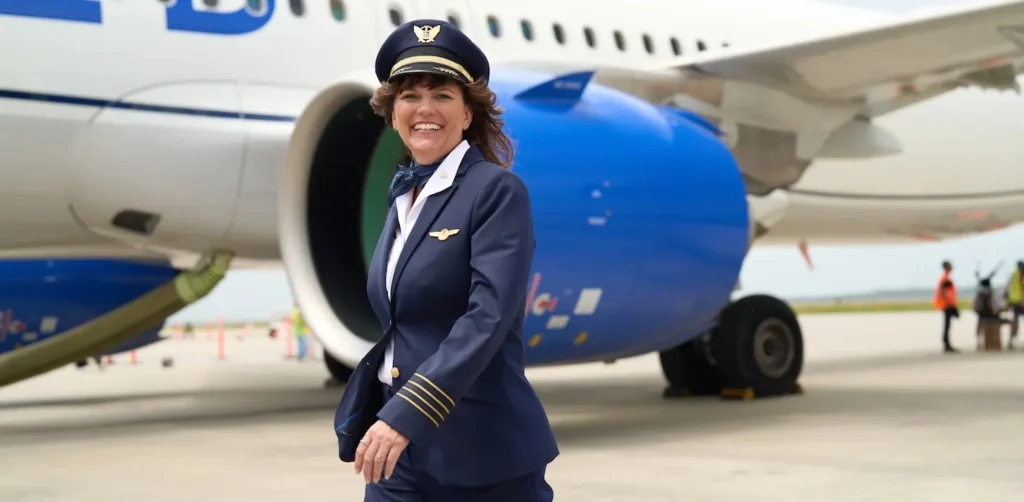Welcome! This guide walks you through united airlines careers in a clear, friendly way. You will learn about job types, the application steps, pay and benefits, training paths, and smart tips. I wrote this to be simple. Sentences are short. Ideas are easy to follow. If you are new to aviation, this will help. If you already work in travel, you will find growth ideas too. I include trusted info and recent facts from United and industry sources. You’ll also get honest notes on training and common pitfalls. Read it slowly. Save the parts you need. Use the checklist at the end to plan your next move into united airlines careers.
Why choose United as an employer?
United is one of the largest global airlines. That size creates many job paths. You can work in airports, labs, offices, and on planes. United offers health plans, retirement options, and travel perks that staff value. Many employees also mention professional training and internal mobility. If you want long-term growth, large airlines can offer clear career ladders. Smaller teams in big companies often let you try new roles. For people who love travel, employee travel privileges are a real perk. If stability and a wide choice of roles matter to you, united airlines careers are worth exploring. For an overview of open roles and program descriptions, see United’s careers portal.
What kinds of jobs are available?
United hires many job types. You will find entry-level roles like ramp agent and customer service agent. There are technical roles, such as aircraft mechanic and avionics technician. The airline also hires flight attendants, pilots, and load planners. In addition, United needs staff in IT, finance, marketing, and airport operations. Leadership roles are always open for people with deep experience. Many roles have training pathways or apprenticeships. This variety is why people visit united airlines careers pages often. If you want a desk job or a hands-on role on the ramp, United likely has an option. Check the official listings for current openings and job descriptions.
How to search jobs and submit an application
Start at United’s official careers portal. Use filters for location, job family, and job level. Create a profile and upload a clean resume. Many roles require an online application and an assessment test. Save job IDs and deadlines. You may be asked to answer short questions about experience and eligibility. If invited, complete assessments quickly and honestly. Keep copies of any confirmation emails. Treat each role as unique by tailoring your resume and cover note to match the job words. Following these steps helps you move through the united airlines careers application clearly and on time.
The hiring process — step by step
United’s hiring steps can vary by role. A common flow is: apply online, take an assessment, then a recorded or live interview. For flight attendants, United uses a pre-recorded interview and sometimes a live virtual interview. For technical or leadership roles, there may be additional manager interviews and skills checks. Background checks and drug testing are normal before hire. Some positions require certifications or a valid passport. The whole process can take weeks to months. Patience helps. Track your application in the portal and respond promptly to requests. For details on interviews and the inflight path, United explains steps on its careers pages.
United Aviate and the pilot pathway
If you want to be a pilot, United’s Aviate program is a key pathway. Aviate helps aspiring pilots build a clear path toward a United flight deck. The program links training, mentorship, and hiring steps. There is also an Aviate Academy for initial flight training and United’s Pathways programs for skill building. Be aware: recent news shows both positive support and industry scrutiny for training schools, so research carefully. If you are serious about a flight deck career, study the Aviate path and the kind of flight hours and ratings they expect. Use official Aviate resources to plan your route into united airlines careers as a pilot.
Training, apprenticeships, and upskilling
United offers apprenticeships and development programs under its United Pathways initiative. These programs aim to remove barriers like cost or degree requirements for in-demand roles. You can find apprenticeships for maintenance technicians, digital tech roles, and more. Training often combines classroom work, hands-on practice, and mentorship from experienced staff. For many technical roles, certifications matter more than a college degree. If you join an apprenticeship, you often start with paid, on-the-job learning. This can be a smart way into united airlines careers without heavy debt. Official pages explain available pathways and how to apply.
Resume and application tips that actually work
Use a simple resume format. Put skills and certifications at the top. Match words from the job posting. For aviation roles, list licenses and ratings clearly. For customer-facing jobs, show customer service examples. Keep bullet points short. Quantify results like “handled 100+ passengers per shift” or “reduced boarding delays by 20%.” For online forms, keep answers precise and truthful. Prepare a short cover note that explains why you want the specific role. Small details, like correct job ID and clean file names, matter. These steps improve your chance in united airlines careers.
Interview prep and common questions
Practice short stories that show your skills. Use S-T-A-R structure: Situation, Task, Action, Result. Expect questions about safety, teamwork, and customer care. For technical roles, expect skills tests and scenario-based questions. For cabin crew, recruiters ask about coping with emergencies and handling upset passengers. Be ready to describe a time you solved a problem under pressure. Show calm, clear speech and positive energy. Mock interviews help. Study recent employee reviews and common interview tips to know what hiring teams value. Online forums also share real interview experiences for United roles.
Entry-level jobs: where to start and grow
Many people start as ramp agents or customer service agents. These jobs teach core skills: safety, teamwork, and time pressure handling. Ramp work builds knowledge of aircraft, fueling, and baggage systems. Customer service roles build people skills and policy knowledge. These entry jobs often lead to internal moves into ops, training, or leadership. If you want to climb, ask for extra tasks and volunteer for cross-training. Keep records of courses and certifications. Internal job postings often favor staff who already know the company and show steady performance. Entry roles are practical first steps into united airlines careers.
Career growth and internal mobility
United has many paths for growth. Staff move from ramp to lead, from customer service to supervisor, and from tech roles to management. Promotions often require experience and performance. United also posts internal openings for qualified employees. Use mentorship and performance reviews to set goals. Build relationships with managers and ask for feedback. Learn related skills like scheduling systems or basic accounting. If you aim for a long-term career with United, keep a growth plan and update it yearly. This focused approach helps you find and land internal roles in united airlines careers.
Pay, benefits, and perks — what you should know
United offers competitive pay and a benefits package. Staff commonly cite health plans, dental, vision, and retirement plans like 401(k). Employee travel privileges and discounted fares are widely reported. Pilots and unionized roles often have negotiated contracts that affect pay and time off. For example, pilots recently ratified a major contract with significant pay increases and improved leave terms. Benefits will vary by role, location, and union status. Always check the official United benefits resource and company updates for the current details before deciding.

What to expect after you are hired
Onboarding often includes online training, safety modules, and role-specific classes. You will meet your team and a mentor in many roles. For cabin crew, expect several weeks of classroom and hands-on training. Technical staff may begin with shadowing and certifications. Employee portals handle scheduling, pay, and benefits. Many new hires find the first three months are a learning sprint. Keep questions ready and record key procedures in a notebook. Build good habits early: show up on time, ask for clarity, and document your wins. This steady start helps you build a strong career at United and in united airlines careers more broadly.
Honest cautions and what to research before you apply
Large companies have pros and cons. You may face shift work, early mornings, and physical tasks. Aviation rules require compliance with safety and testing. For pilot trainees, check training costs, timelines, and student experiences carefully. Recent legal cases and news have raised questions about some flight training programs. Always read multiple sources before committing to expensive training. Talk to current employees if you can. Use official pages for factual program details and independent reviews for personal experiences. This balanced research will protect your time and money as you pursue united airlines careers.
LSI and related keywords you’ll see in job ads
When you search, expect words like “aviation jobs,” “airline jobs,” “flight attendant,” “pilot careers,” “airport operations,” “crew member,” “passenger service,” “aviation maintenance,” “airline hiring,” “resume tips,” and “interview tips.” These keywords match skills and tasks recruiters want. Mirror those words in your resume and application where you genuinely have experience. Doing this helps automated systems find you. For technical roles, include precise certifications and trade terms. For customer roles, use phrases like “customer service,” “safety procedures,” and “baggage handling.” Using the right words helps your application stand out in united airlines careers searches.
Quick checklist to apply this week
Pick one role that matches your skills. Read its job description fully. Update your resume to mirror the job words. Apply online and save your confirmation. If invited to an assessment, schedule it promptly. Practice short STAR stories for interviews. If the role requires certifications, gather documents now. Sign up for relevant short courses if you lack a key skill. Reach out to one current United employee on LinkedIn for a short, polite question about the role. Small moves make big differences when you are moving toward united airlines careers.
Frequently Asked Questions
Q1 — What qualifications do I need to start united airlines careers?
Most entry roles need a high school diploma or GED. Some technical roles need specific certifications. Pilots need FAA certificates and flight hours. Flight attendants often must be 21 and pass a background check. Many office roles ask for a degree or related experience. Apprenticeships may remove degree needs by focusing on skills. Check the job posting for exact minimums. If you lack a certificate, consider an apprenticeship or training program tied to United Pathways. Those programs are often designed to help people enter aviation careers without heavy debt.
Q2 — How long does the hiring process usually take?
Times vary by job. Some hires move in weeks. Others take months when many approvals are needed. Technical roles may need extra checks and training slots. Flight roles often include recorded interviews and classroom training afterward. Background checks, drug tests, and credential verification can add time. Be patient and keep your documents ready to speed things up. Track your application in the portal and reply quickly to recruiter messages to keep momentum in your united airlines careers pursuit.
Q3 — Does United offer tuition help or apprenticeships?
Yes. United Pathways lists apprenticeships and development programs. These aim to lower barriers to entry for in-demand jobs. Some programs combine paid work and training. For aspiring pilots, Aviate and Aviate Academy are part of the broader pathway, though costs and steps can vary. Always check the latest United Pathways pages for current offerings and eligibility. Apprenticeships can be a strong route into united airlines careers without high debt.
Q4 — Are employee travel benefits real and usable?
Yes. United employees often get travel privileges. Benefits include discounted or standby travel and discounts for family members. The exact rules depend on role, seniority, and union contracts. Travel benefits can be a valuable perk for people who want to see the world. Always read the company travel policy for limits, blackout dates, and rules for companions to fully use this perk in united airlines careers.
Q5 — How can I stand out as an applicant?
Match your resume to the job words. Show measurable results. Include certifications and specific technical skills. For frontline roles, highlight teamwork and calm under pressure. For tech jobs, list systems and languages you know. Practice clear, short interview stories. Volunteer for cross-training if you already work at an airline. Small, honest wins make a big difference in hiring decisions for united airlines careers.
Q6 — Is union membership common at United?
Many operational roles at United are unionized. Pilots, mechanics, and some other job groups commonly belong to unions. Union contracts shape pay, schedules, and benefits for those roles. For pilots, a major contract was ratified that changed pay and time-off terms. Union presence can be a key factor in your job choice and long-term planning. Check the role’s job page and ask recruiters about union status for clarity.
Final words — take the next step
If you are ready, pick one job and apply today. Use the checklist above. Keep notes on every step. Join online groups for tips and interview practice. Remember that united airlines careers cover many types of work. You can start in a customer role and grow into tech, training, or management. Be honest about your skills, and keep learning. If you want, tell me the specific United job you’re eyeing. I can help tailor a resume bullet list, mock interview questions, or a short cover note you can use. Good luck — and fly into your next career move with confidence.


